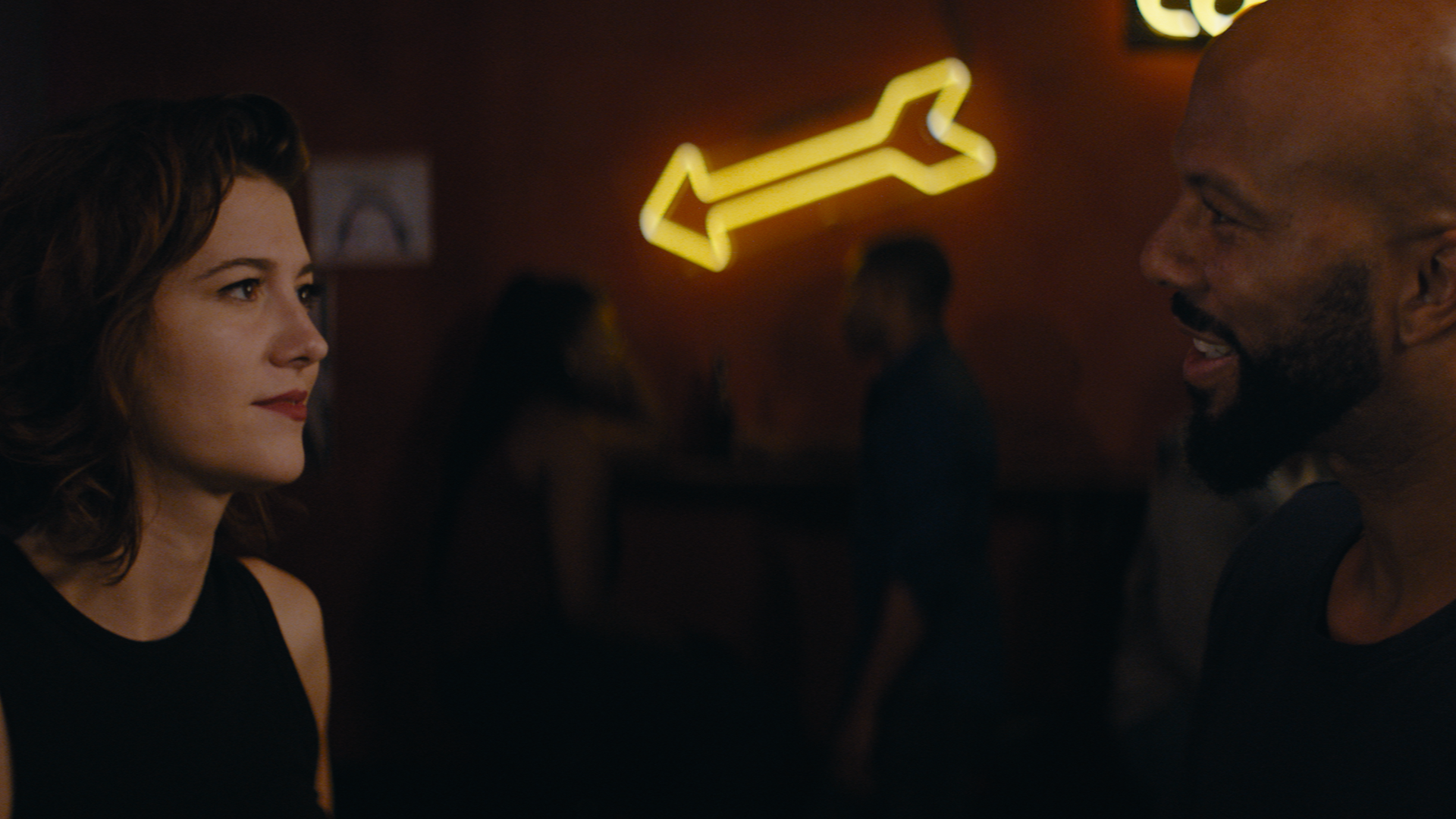
Writer-director Eva Vives took some time on Thursday to speak with Solzy at the Movies ahead of All About Nina‘s release in theaters this weekend.
Congrats on the release of All About Nina.
Eva Vives: Thank you so much. How are you doing?
I’m doing well. I’m enjoying somewhat of a breather between TIFF and the Chicago International Film Festival.
Eva Vives: You got sick after Toronto like everyone else I know.
I came back feeling so run down that Saturday. I must have slept until 2:00 PM in the afternoon.
Eva Vives: Oh, wow. That sounds really nice, actually. I haven’t slept much this week. Did you watch any of the hearings today?
No, I have tried to keep myself distracted as much as I can.
Eva Vives: Yeah. I can understand that. It’s been a pretty rough day for myself so it’s nice to talk to you.
I spent my afternoon watching The Good Place screeners.
Eva Vives: That’s really nice.
After premiering the film during Tribeca this past April, how relieving is it to finally have it out in the world this weekend?
Eva Vives: I don’t know yet. I guess we’ll see. I feel pride and I feel a sense of accomplishment and I feel a lot of happiness about it as a creative endeavor especially because I had such a wonderful time on set with the actors. I’ve had a lot of really good friendships. I have to say that everything that has happened in between me writing and making the movie and where we are now but specifically #MeToo. Today, the hearings. It’s not easy and though I am for the most part—I don’t if happy is the right word—glad that it’s happening and that we’re talking about it. It’s also very troubling and difficult just on a day to day basis. I spent most of the day watching Dr. Ford give her testimony and fielding calls from friends and survivors and crying and not really knowing where to put all of that. So I’m hoping that this film—I always made it certainly with survivors in mind and I was hoping that it would at least give them a little bit of a sense of hope and relief to see a type of survivor portrayed in a realistic way and watch her—despite her troubles—go through her life being able to work and do something that she’d love to do and do it well and be at least professionally successful. But I don’t know. I hope that it hits for them and that it helps. I have no idea how I’m going to feel about it. I guess I can tell you on Monday, maybe. I’ve been hearing from a lot of survivors and that’s always very moving, and for me, special, obviously.
I just I remember watching it April. It just felt so personal and so relevant in light of everything that’s happened over the last year or so.
Eva Vives: Yeah, it’s pretty crazy that—the confluence of it. I guess in a way that’s what happens, right?. Clearly I’m not alone in this and so many people—by the way not just survivors but certainly this is happening in so many different realms of these so-called minorities who have been—I think—I don’t feel like we are minorities—that are speaking our truth and standing up for ourselves and being honest, and not always without a cost yet but I think in doing so, we are opening up a lot of doors. I think there’s a lot of hope there but it’s just all so difficult right now.
I know the thing that impressed me the most was you wrote all of the stand-up comedy material in the film yourself.
Eva Vives: Yeah. I don’t know why people are so impressed by that but maybe I should take more credit. I mean—I’m a writer. It’s my job.
Did you have any kind of history with stand-up prior to the film?
Eva Vives: I mean I was a fan myself but I but I have been in that world for a long, long time. It’s something that gave me a lot of solace growing up. Specifically Richard Pryor because he talked about his abuse so much on stage—which I think he was probably the first comedian at least that I know of to do that. It was pretty brutal stuff and he just put it all out there. So that always impressed me and I remember that. I listened to him a lot and listened to George Carlin. Mostly men because they really weren’t that many female comedians at the time. And then when to New York at 18, I’ll say that its sort of an overstatement but saw a comedian for two minutes. I didn’t continue to see him for very long but he introduced me to the Boston Comedy Club, which at the time which was really one of the best in the West Village. And so I just kept going because I loved it and I love seeing how comedians rework their material and how they change the jokes. I really took it from a writing point of view which maybe explains why it was relatively easy for me to do. So yeah, I was very much acquainted with the world and I’ve always continued to see all the stand-up. Obviously now with Netflix and stuff, Ali Wong—so many of the great female comedians that are now bringing their own point of view to things.
Mary Elizabeth Winstead’s performance is award-worthy in my opinion.
Eva Vives: Thank you. Thank you. Yeah, I think so, too. I thought that about her for a long time and I keep thinking like, Can you imagine if she was a dude or if a dude acted the way she was? She would have gotten nominations or won Oscars already. Like I think it’s another instance in which she’s being undermined by her gender and in this case.
How did she become involved with the film?
Eva Vives: So I got lucky enough that my husband knew her from something—they had worked on some project together. Because I knew that I wanted her to play the role, I just asked him to send it to her and she read it and emailed me right away and said, “I love this. What’s going on? Can we talk about it?” So we met for coffee and I think I think she thought she had to fight to get it. And I was like, “No, I already wanted you want you for this if you want to do it and she was like, “Yeah, I’m in.” I mean we had talked about it at that moment. It was important for her to know that it was my story and that I was coming to it from a place of honesty and that I would have a lot of information for her about all that, and at the end she was terrified about doing stand-up and rightly so because it is a really difficult thing to do. But I never had any doubts—to me, it’s just a question of working it.
How did the rest of the cast come together?
Eva Vives: The rest of them—it’s fairly boring in the sense that I think I got lucky. I don’t know if is because it was my personal story so whoever responded to it wasn’t going to be an asshole about anything. There’s not a lot of money involved and nobody did it for the money. They did it because they wanted to. Once that have Mary—casting Rafe or seeing who to go to was a little difficult because I did—and I hope this comes through. I wanted somebody that didn’t feel obvious in that they would be a little bit like off with each other. I always liked Common a lot as a person and as an actor and a performer. Somehow I thought, if he was interested in it. I liked trying to cast people were unexpected in parts. So I did go to his agent. I didn’t anybody that knew him to send them a letter. He called me really quickly actually. He said a similar thing. He said, “I love this character and I would love to do it.” You always need to talk more about if you see them the same way or not, which is the most important thing. It’s funny that we ended up with a group of people who I think—so many of these actors are so successful and accomplished but had gone through like somehow they weren’t being listened to in their lives. I remember when I went to Kate del Castillo—I didn’t know it at the time but later on she told me that she hadn’t worked in two years because of this whole El Chapo business with Sean Penn. She had persona non-grata for a while—which again, I didn’t know when I offered her the part. I think a lot of us were working our own stuff and it showed on the set. We had a lot of fun with each other. I got really lucky basically is what I’m saying.
Given that this was your first feature film did it ever feel overwhelming at times?
Eva Vives: The only part that felt overwhelming was the time constraints. There was a lot to shoot and I think in the hands of not even like a lesser actor but just somebody who isn’t ready to go all the time and you can throw everything and the way that Mary is. We probably wouldn’t have gotten most of it because we were definitely not rushing but stringing to get everything that we needed to do. I like giving actors a lot of time and I like trying different things so that was hard to do. So yeah, a little bit overwhelming in that way but not in—the first day I was kind of a little bit in disbelief like I can’t believe it’s actually happening. You know you fight for so long and of course, the movie had fallen apart at some point like all movies do. After a while, you’re just very conscious in your enthusiasm of actually getting it made. I remember the first day we shot with Nina’s mom, Camryn Manheim and Mindy Sterling, who plays the nosy neighbor—so it was fairly easy to get into it. It turns out I didn’t know that Camryn and Mindy knew each other in real life and they were very friendly. It made for a very relaxed atmosphere. As Mary and I talked, it took a minute to find the character like that—like she can’t just come onto set and have Nina be ready to go out. So it was interesting that way. But, yeah. And then as the days go by you’re like nope, this is actually happening.
Have you started thinking about the next film or are you just going to wait to see this one through?
Eva Vives: Oh, no. I’ve been writing non-stop. I love writing and it keeps me sane. I’ve have been doing it my whole life so I actually already have two scripts are pretty much ready to go and then. What’s getting exciting now is as a director, I’m also getting interest in terms of other projects that I can direct. Of course, I have television to consider, which is so big and interesting now. But yeah, I have a revenge film that is quite different from this that I would love to do. Another one that’s set in the theater world kind of like All About Eve. So those are the two other things that I’ve been writing.
Thanks again for your time and congrats on the film.
Eva Vives: Thank you so much. We appreciate all the support you’ve been given at that time. It means a lot.



